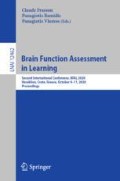Abstract
Mild cognitive impairment (MCI) affects an increasing number of the elderly. MCI is in many cases the first sign of dementia, which is one of the main reasons for disability in the elderly worldwide. In people with MCI, it is essential to regularly evaluate their cognitive status due to the uncertain course of symptoms, that is not completely achieved with traditional assessment procedures. Technological advances, especially in mobile and portable devices, have made possible the delivery of new forms of cognitive training and new methods for cognitive evaluation of healthy older adults or of individuals with MCI. Easy to use and engaging applications can serve as a new means of providing enjoyable cognitive interventions that offer the required commitment of their users. The ability of long-term, remote and autonomous monitoring of the cognitive course of individuals in combination with new technological measures, new specialized algorithms and built-in sensors in their mobile devices offer new data streams to clinicians and the possibility of timely and personalized intervention. This review presents existing cognitive interventions and evaluation studies in adults with or without cognitive impairment, that utilized mobile devices in this context. Their encouraging results provide the breeding ground for the proposal of developing new interventions on future research, that will take advantage of the potentials and prospects of mobile digital devices technology.
Access this chapter
Tax calculation will be finalised at checkout
Purchases are for personal use only
References
World Health Organization: Risk reduction of cognitive decline and dementia: WHO guidelines. In: Risk reduction of cognitive decline and dementia: WHO guidelines, pp. 401–401 (2019)
Petersen, R.C., et al.: Practice guideline update summary: mild cognitive impairment: report of the guideline development, dissemination, and implementation subcommittee of the American Academy of Neurology. Neurology 90(3), 126–135 (2018)
Alzheimer’s Association: Alzheimer’s disease facts and figures. Alzheimer’s Dement. 15(3), 321–387 (2019)
10 facts on dementia. http://www.who.int/features/factfiles/dementia/en/. Accessed 2 Apr 2020
World Health Organization: Alzheimer’s disease: help for caregivers (No. WHO/MNH/MND/94.8. Unpublished). World Health Organization, Geneva (1994)
Albert, M.S., et al.: The diagnosis of mild cognitive impairment due to Alzheimer’s disease: recommendations from the National Institute on Aging-Alzheimer’s Association workgroups on diagnostic guidelines for Alzheimer’s disease. Alzheimer’s Dement. 7(3), 270–279 (2011)
Petersen, R.C.: Mild cognitive impairment as a diagnostic entity. J. Intern. Med. 256(3), 183–194 (2004)
What is mild cognitive impairment (MCI)? Fact sheet 470LP. https://www.alzheimers.org.uk/get-support/publications-factsheets/publications-dementia. Accessed 2 Apr 2020
Help for caregivers. https://www.who.int/mentalhealth/neurology/dementia/help_for_caregivers/en/. Accessed 2 Apr 2020
Li, H., Li, J., Li, N., Li, B., Wang, P., Zhou, T.: Cognitive intervention for persons with mild cognitive impairment: a meta-analysis. Ageing Res. Rev. 10(2), 285–296 (2011)
Savulich, G., et al.: Cognitive training using a novel memory game on an iPad in patients with amnestic mild cognitive impairment (aMCI). Int. J. Neuropsychopharmacol. 20(8), 624–633 (2017)
Petersen, R.C., Caracciolo, B., Brayne, C., Gauthier, S., Jelic, V., Fratiglioni, L.: Mild cognitive impairment: a concept in evolution. J. Intern. Med. 275(3), 214–228 (2014)
Joshi, V., Wallace, B., Shaddy, A., Knoefel, F, Goubran, R, Lord, C.: Metrics to monitor performance of patients with mild cognitive impairment using computer based games. In: 2016 IEEE-EMBS International Conference on Biomedical and Health Informatics (BHI), pp. 521–524. IEEE (2016)
Morris, M., Intille, S.S., Beaudin, J.S.: Embedded assessment: overcoming barriers to early detection with pervasive computing. In: Gellersen, H.-W., Want, R., Schmidt, A. (eds.) Pervasive 2005. LNCS, vol. 3468, pp. 333–346. Springer, Heidelberg (2005). https://doi.org/10.1007/11428572_20
Mielke, M.M., et al.: Performance of the CogState computerized battery in the mayo clinic study on aging. Alzheimer’s Dement. J. Alzheimer’s Assoc. 11(11), 1367–1376 (2015)
Martínez-Alcalá, C.I., Rosales-Lagarde, A., Hernández-Alonso, E., Melchor-Agustin, R., Rodriguez-Torres, E.E., Itzá-Ortiz, B.A.: A mobile app (iBeni) with a neuropsychological basis for cognitive stimulation for elderly adults: pilot and validation study. JMIR Res. Protoc. 7(8), e172 (2018)
Scase, M., Marandure, B., Hancox, J., Kreiner, K., Hanke, S., Kropf, J.: Development of and adherence to a computer-based gamified environment designed to promote health and wellbeing in older people with mild cognitive impairment. eHealth, 348–355 (2017)
Zygouris, S., et al.: Can a virtual reality cognitive training application fulfill a dual role? Using the Virtual Super Market cognitive training application as a screening tool for mild cognitive impairment. J. Alzheimers Dis. 44(4), 1333–1347 (2015)
Zygouris, S., et al.: A preliminary study on the feasibility of using a virtual reality cognitive training application for remote detection of mild cognitive impairment. J. Alzheimers Dis. 56(2), 619–627 (2017)
Laske, C., et al.: Innovative diagnostic tools for early detection of Alzheimer’s disease. Alzheimer’s Dement. 11(5), 561–578 (2015)
Rodakowski, J., Saghafi, E., Butters, M.A., Skidmore, E.R.: Non-pharmacological interventions for adults with mild cognitive impairment and early stage dementia: an updated scoping review. Mol. Aspects Med. 43, 38–53 (2015)
Acknowledgments
This research is funded by the European Union and Greece (Partnership Agreement for the Development Framework 2014–2020) under the Regional Operational Programme Ionian Islands 2014–2020, project title: “Enhancing cognitive abilities of people with Mild Cognitive Impairment through measurable cognitive training—NEUROEDUCATION”, project number: 5016113.
Author information
Authors and Affiliations
Corresponding author
Editor information
Editors and Affiliations
Rights and permissions
Copyright information
© 2020 Springer Nature Switzerland AG
About this paper
Cite this paper
Giannopoulou, P. (2020). Mobile Technology for Cognitive Training and Evaluation of People with Mild Cognitive Impairment. In: Frasson, C., Bamidis, P., Vlamos, P. (eds) Brain Function Assessment in Learning. BFAL 2020. Lecture Notes in Computer Science(), vol 12462. Springer, Cham. https://doi.org/10.1007/978-3-030-60735-7_20
Download citation
DOI: https://doi.org/10.1007/978-3-030-60735-7_20
Published:
Publisher Name: Springer, Cham
Print ISBN: 978-3-030-60734-0
Online ISBN: 978-3-030-60735-7
eBook Packages: Computer ScienceComputer Science (R0)

